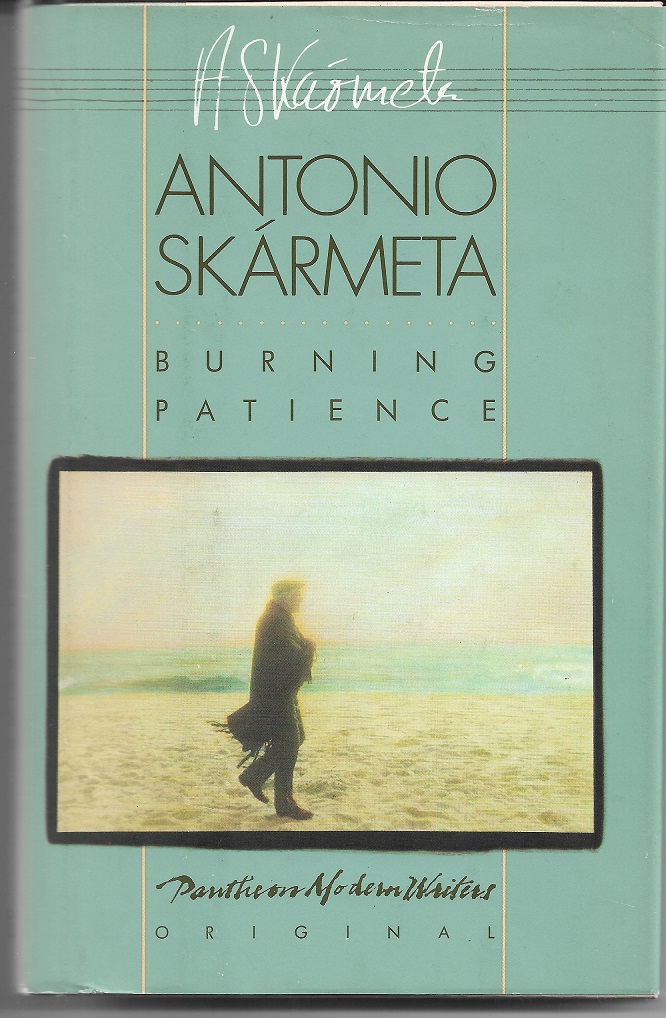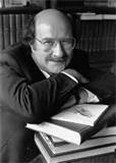Burning Patience by Antonio Skarmeta. New York. 1987. Pantheon Books. Translated From The Spanish By Katherine Silver. 119 pages. Jacket photograph by Christine Rodin. Jacket design by Louise Fili. 0394555767. April 1987. Originally published in the United States in Spanish as Ardiente Paciencia by Ediciones del Norte, Hanover, N. H. in 1985.
 FROM THE PUBLISHER -
FROM THE PUBLISHER -
Witty, hilarious, delightfully readable, Antonio Skarmeta's new novel, BURNING PATIENCE, is a bittersweet tale of adolescent love set against the sadness of Chile's recent history. Its situation is simplicity itself. Teenager Mario Jimenez, wildly in love with Beatriz Gonzalez, the local bar-owner's daughter, is the postman of Isla Negra. In this small Chilean fishing village where almost everyone is illiterate, Mario's only customer is none other than Latin America's greatest poet, Pablo Neruda. What an opportunity, if not to become a poet, at least to enlist this most famous romantic and lover in a campaign to set the woman of his dreams on fire! As the beautiful Beatriz falls under the spell of adolescent fervor and Neruda's words, this very down-to-earth, erotic fairy tale of a young man and his famous guardian angel gains an immense charm, humor - and power, For it is also a tale about the power others have to destroy poets and mailmen alike, but not the words they have let loose in the world.
 Antonio Skármeta (born Esteban Antonio Skármeta Vranicic on November 7, 1940) is a Chilean writer descending from Croatian immigrants from the Adriatic island of Brač, Dalmatia. He was awarded Chile's National Literature Prize in 2014. His 1985 novel and film Ardiente paciencia ('Ardent Patience') inspired the 1994 Academy Award-winning movie, Il Postino (The Postman). Subsequent editions of the book bore the title El cartero de Neruda (Neruda's Postman). His fiction has since received dozens of awards and has been translated into nearly thirty languages worldwide. Skármeta studied philosophy and literature both in Chile and at Columbia University in New York. From 1967 to 1973, the year he left Chile (first to Buenos Aires and later to West Berlin), he taught literature at the University of Chile. In 1987, he was a member of the jury at the 37th Berlin International Film Festival. In 1989, after the end of Pinochet’s military dictatorship, the writer returned to Chile in order 'to create political space for freedom'. He hosted a television program on literature and the arts, which regularly attracted over a million viewers. From 2000 to 2003 he served as the Chilean ambassador in Germany. He teaches classes at Colorado College both in Santiago, and Colorado Springs. In 2011 his novel Los días del arco iris won the prestigious Premio Iberoamericano Planeta-Casa de América de Narrativa, one of the richest literary prizes in the world worth $200,000. His unpublished play El Plebiscito was the basis of Pablo Larraín's successful drama film No.
Antonio Skármeta (born Esteban Antonio Skármeta Vranicic on November 7, 1940) is a Chilean writer descending from Croatian immigrants from the Adriatic island of Brač, Dalmatia. He was awarded Chile's National Literature Prize in 2014. His 1985 novel and film Ardiente paciencia ('Ardent Patience') inspired the 1994 Academy Award-winning movie, Il Postino (The Postman). Subsequent editions of the book bore the title El cartero de Neruda (Neruda's Postman). His fiction has since received dozens of awards and has been translated into nearly thirty languages worldwide. Skármeta studied philosophy and literature both in Chile and at Columbia University in New York. From 1967 to 1973, the year he left Chile (first to Buenos Aires and later to West Berlin), he taught literature at the University of Chile. In 1987, he was a member of the jury at the 37th Berlin International Film Festival. In 1989, after the end of Pinochet’s military dictatorship, the writer returned to Chile in order 'to create political space for freedom'. He hosted a television program on literature and the arts, which regularly attracted over a million viewers. From 2000 to 2003 he served as the Chilean ambassador in Germany. He teaches classes at Colorado College both in Santiago, and Colorado Springs. In 2011 his novel Los días del arco iris won the prestigious Premio Iberoamericano Planeta-Casa de América de Narrativa, one of the richest literary prizes in the world worth $200,000. His unpublished play El Plebiscito was the basis of Pablo Larraín's successful drama film No.